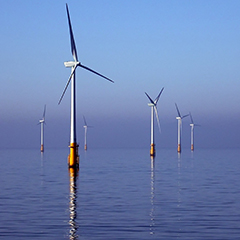A national consortium has been awarded additional funding to cement the UK’s position as a global leader in offshore renewable energy (ORE) innovation and research.
The Supergen ORE Hub was created in July 2018 to bring together a network of academic, industrial and policy stakeholders to champion and maintain the UK’s wave, tidal and offshore wind expertise.
It was initially awarded £5million by the Engineering and Physical Sciences Research Council (EPSRC), and has now received an additional £4million in EPSRC funding to expand the support it offers researchers working across the country.
The Supergen ORE Hub is led by Professor Deborah Greaves OBE, Head of the School of Engineering and Computing, Electronics and Mathematics at the University of Plymouth. It includes academics from the University of Aberdeen, University of Edinburgh, University of Exeter, University of Hull, University of Manchester, University of Oxford, University of Southampton, University of Strathclyde, and the University of Warwick.
It is also working with an advisory board, made up of industry leaders, policy makers and other key stakeholders, to ensure it is addressing the key challenges faced by companies in the ORE sector.
Through that, it aims to build a collaborative approach that can address any technical, environmental and interdisciplinary challenges, which require a coordinated response at a national and regional level.
Professor Greaves said: “This additional investment is fantastic news and further recognition that offshore renewables have a vital role to play in the UK’s future energy generation. It will enable us to build on our existing ambitious programme of work, providing greater funds for early career and established researchers within the Supergen ORE hub. It also means we can offer more support to those from other institutions, strengthening the UK’s collective status as a world leader in this exciting and rapidly expanding field.”
The new investment will allow extra funding to be made available through the Hub’s Flexible Fund, providing grants of up the £100,000 to seed areas that complement existing research, fill gaps or add cross cutting activities to explore the transfer of research findings between sectors within ORE.
It will also enable an additional number of Post-Doctoral researchers to be employed across the 10 partner universities, expanding the Hub’s Early Career Researchers network.
More money will also be invested into the Hub’s Research Landscape, an interactive tool designed to create a comprehensive database of ORE research taking place in universities and other organisations across the UK.
Ross Wigg, Chair of the Supergen ORE Advisory Board and Renewables Director – Asset Performance at the LOC Group, said: “The renewables industry is now a significant player in the nation’s energy landscape. By working closely with scientists and policy makers, we can tap into their knowledge and expertise to benefit large and small companies working across the UK and beyond. The Supergen ORE hub is an excellent example of this collaborative approach in action, and I believe this additional funding can be used to help the whole sector achieve its full potential.”
Professor Lynn Gladden, Executive Chair of EPSRC, added: “Developing offshore renewable energy technologies is vital to the UK’s transition to a low carbon economy. Exploiting clean energy is a pressing need around the world, both in meeting rising demand and combating climate change. This additional funding for the Supergen ORE Hub will mean more institutions and researchers are able to apply themselves to producing solutions to the challenges we face in the energy sector.”
About the University of Plymouth
The University of Plymouth is renowned for high quality, internationally-leading education, research and innovation.
With a mission to Advance Knowledge and Transform Lives, Plymouth is a *top 50 research university with clusters of world class research across a wide range of disciplines including marine science and engineering, medicine, robotics and psychology. A twice winner of the Queen’s Anniversary Prize for Higher Education, the University of Plymouth continues to grow in stature and reputation.
It has a strong track record for teaching and learning excellence, and has one of the highest numbers of National Teaching Fellows of any UK university. With 18,000 students, and a further 15,000 studying for a Plymouth degree at partner institutions in the UK and around the world, and over 100,000 alumni pursuing their chosen careers globally, it has a growing global presence.
* Research Fortnight Research Power League Table 2014.
The Supergen ORE Hub
The Hub is a £5 Million Engineering and Physical Sciences Research Council (EPSRC) funded project. Led by Prof. Deborah Greaves OBE, Head of School of Engineering at the University of Plymouth, the Hub is a consortium of Universities researching Offshore Renewable Energy which also includes University of Aberdeen, University of Edinburgh, University of Exeter, University of Hull, University of Manchester, University of Oxford, University of Southampton, University of Strathclyde and University of Warwick.
The Supergen ORE Hub is one of several Hubs created by EPSRC to deliver sustained and coordinated research on Sustainable PowER GENeration and supply.
The Supergen ORE Hub brings together and builds on the work of the former Wind and Marine Supergen Hubs following consultation with the research community. The new hub looks for synergies between wind, wave and tidal technologies as well as building on current research in each area.
The Engineering and Physical Sciences Research Council (EPSRC)
The Engineering and Physical Sciences Research Council (EPSRC) is part of UK Research and Innovation, a non-departmental public body funded by a grant-in-aid from the UK government.
EPSRC is the main funding body for engineering and physical sciences research in the UK. By investing in research and postgraduate training, we are building the knowledge and skills base needed to address the scientific and technological challenges facing the nation.
Our portfolio covers a vast range of fields from healthcare technologies to structural engineering, manufacturing to mathematics, advanced materials to chemistry. The research we fund has impact across all sectors. It provides a platform for future UK prosperity by contributing to a healthy, connected, resilient, productive nation.


























